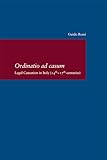Ordinatio ad casum : legal causation in Italy (14th-17th Centuries) / Guido Rossi.
Material type: TextSeries: Studien zur europäischen Rechtsgeschichte ; 339Publisher: Frankfurt am Main : Vittorio Klostermann, 2023Description: ix, 331 pagine ; 24 cmContent type:
TextSeries: Studien zur europäischen Rechtsgeschichte ; 339Publisher: Frankfurt am Main : Vittorio Klostermann, 2023Description: ix, 331 pagine ; 24 cmContent type: - testo (txt)
- senza mediazione (n)
- volume (nc)
- 9783465046080
- 3465046080
- KD 1787.R77 2023
| Item type | Current library | Call number | Status | Barcode | |
|---|---|---|---|---|---|
 Opera (Magaz.)
Opera (Magaz.)
|
Biblioteca "Angelicum" Pont. Univ. S.Tommaso d'Aquino Temporary Library | KD 1787.R77 2023 (Browse shelf(Opens below)) | Available | 0030219594 |
Browsing Biblioteca "Angelicum" Pont. Univ. S.Tommaso d'Aquino shelves, Shelving location: Temporary Library Close shelf browser (Hides shelf browser)
| No cover image available |

|

|

|

|
No cover image available |

|
||
| KD 1785.C75 Contributi alla giurisprudenza di legittimità : gli orientamenti della Procura generale in materia civile, penale e disciplinare 2009 / | KD 1787.C71 2007 Codice penale e leggi complementari / | KD 1787.D63 Diritto penale : parte generale / | KD 1787.R77 2023 Ordinatio ad casum : legal causation in Italy (14th-17th Centuries) / | KD 1795.C27 2020 Elementi di diritto civile / | KD 1795.T81 Istituzioni di diritto civile / | KD 1796.T76 Manuale di diritto privato / |
Bibliografia: pagine 291-323.
Part I. Ordinatio culpae ad causam -- The limits of fault -- Bartolus and the ordinatio of fault to mishap -- Ordinatio and causation in the civil law tradition -- Part II. Causal interlude -- Why a pure theory of causation in the mos italicus would be of little help : two examples (out of many) -- Immediateness, proximity, and ordinatio -- Part III. Ordinatio and criminal law.
The book examines the development of legal causation in Italy from the fourteenth to the seventeenth centuries, focusing especially on practice-oriented literature (decisiones and consilia). Causality began to be discussed from the late thirteenth century and especially during the first half of the fourteenth, when it was described as ordinatio. In private law, ordinatio remained the standard approach to causation during the entire early modern period: centuries of legal practice mainly refined its scope but did not change its core. By contrast, its application in criminal law would increasingly clash with the intentionality requirement, and so it was progressively challenged.


